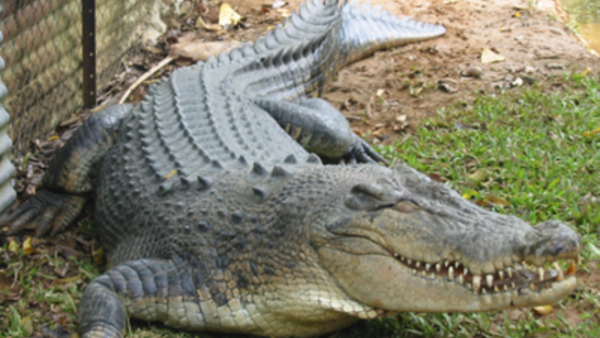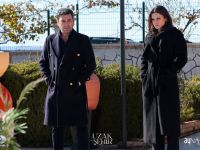Lebanon’s infamous crocodile was sent to London by Animals Lebanon, where it will be hosted by a specialized organization.
The 135-cm crocodile that was found swimming in Beirut’s river was sent to Crocodiles of the World, an educational sanctuary in the U.K. that cares for hundreds of reptiles and raises awareness.
Animals Lebanon, a Lebanese animal rights organization, announced the relocation Monday evening, thanking Sukleen waste management company and Middle East Airlines for sponsoring the move.
“Fortunately, the action was fully covered,” Animals Lebanon President Lana Al Khalil told the Daily Star Tuesday. “Middle East [Airlines] usually sponsors all our rescue flights, which was also the case here.”
Sukleen sponsored all the necessary medical checks, veterinary procedures and the transport crate of the crocodile for a more personal reason.
The crocodile used to live very close to the company’s plant, and workers would see him swimming in the river.
“They got really attached to him. They gave him a name, sometimes fed him. ... He became part of their area,” Khalil said.
Animals Lebanon, she explained, chooses project sponsors by relevancy to the topic. For Sukleen, they were directly related to the story, so they chose to fund the whole process.
The endangered animal had lived in the polluted river for more than a year. The cemented drainage channel carries industrial waste, and the highly contaminated water quickly destroyed nets setup to capture the crocodile. The skin and legs of chickens floated in the water, as well as the waste from a nearby fish-processing factory.
Rescue workers and volunteers quickly became exhausted or sick after spending hours under the sun and being exposed to the pollution for weeks at a time over the summer.
Khalil said that the crocodile, which was eventually captured by a local fisherman in April, was not the first exotic animal rescued by her NGO.
“We face similar cases of lions, tigers, chimpanzees, bears and many other exotic animals that live in inadequate conditions in Lebanon,” she said.
But the crocodile garnered public attention because of its potential threat to the general public.
“If you are at the wrong place in the wrong time, you would actually be in danger. In the end, it’s a predator,” Khalil said.
Animals Lebanon has two rescue programs ongoing, Khalil explained. The first program rescues companion animals such as dogs and cats that are maltreated or abused in Lebanon. The second, called the wild animals rescue program, deals with exotic animals that have been brought into the country and live in poor conditions.
“People illegally smuggle exotic animals into the country, and when they grow too large to be handled, they either dump them, or put them in substandard conditions,” Khalil said. “This is what happened with this crocodile.”
Khalil said that there were no adequate facilities in the country, which prompts the organization to look for an international sanctuary to host the animals.
Lebanon has recently become a party to the Convention on International Trade in Endangered Species, but endangered species continue to be smuggled in, according to Khalil.
“As for Nile crocodiles, although they should be protected under CITES, they can still be found in pet shops in Lebanon for less than $100,” she added.
“The zoos here are unregulated and follow no international standards,” Khalil said, highlighting that most exotic animals are in private owners’ collections.
The organization’s head explained that even though private collectors often love their exotic animals, they are not able to provide for their special needs, especially proper nutrition and environment.
“Once we rescued a lion whose owner believed he was treating him very well, but thought he was making no mistake by feeding him raw meat only, and putting him in a cage with a concrete floor.
“But lions need to also eat some of the bones and skins of the animals they hunt. Together with the bad physical environment, the nutrition deficiency caused his bones to start breaking, and his health to seriously degrade.”
By Nizar Hassan









